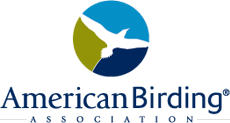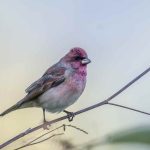…but what you can do for the ABA. For those of you who have not been paying attention to the ins and outs of the American birding scene of late, the ABA is, of course, the American Birding Association, an organization that I recently joined after the board named a new president, Jeff Gordon. With declining membership, near financial collapse, and who knows what other minefields because the board has never publicly said why the last president left, I think I might be a bit crazy to join the organization, even under new leadership. In fact, some seem to think that the organization isn’t serving the interests of the average birder at all. But I like nothing so much as I like an underdog so I ponied up my 45 hard-earned American dollars and am now a member.
Forgive me for being a bit self-centered here, but, contrary to what the title of this post says, I want to know – What do I get? I ask this as someone who has spent the last ten years of his life, until very recently, working as an organizer for and representative of perhaps the most member-driven organizations that exist, labor unions. In the United States, members of labor unions pay monthly dues and in return they get representation, a contract with their employer, legal backing, paid staff to represent them and assist them, political clout, and a host of other benefits. They come out ahead or they tend to decertify the union. Of course, it is a two-way street. For a union to work well and get good contracts members need to be active both on the job and in the union hall. The best unions are those led by the rank-and-file with an active membership that holds leadership accountable so that the dues money and the power of the union are directed at making life better for the members of the union.
So, again, as a member of the ABA, what do I get? And now a second question needs to be asked, and that is, what does the ABA want from me? This brings me back, again, to my experience in the labor movement. Too often members of the union refer to the union as an entity separate from themselves to the point where we had vocabulary to explain the phenomenon: we called it “third-partying.” A union, like the ABA, is no more than its members. Its members, therefore, shouldn’t speak of the union as something that will swoop in and fix their problems as in “The union is going to get us a good contract.”
No, members are going to get a good contract because members are the union, that is, they have internalized their membership and are willing to stand up together and fight for it. This is why one of the ubiquitous chants at union rallies is “We are the union, the mighty mighty union.” It is when the boss manages to convince a union’s members that their interests and the interests of the union do not coincide that problems occur.
The ABA must operate the same way as a successful union does if it has any hope of success. Members, like the always eloquent Nate, must internalize their membership and be willing to take on tasks on behalf of the organization beyond paying the 45 USD per year. This requires organizing, which only makes sense when one is talking about an organization. But how does one organize? And who does one organize?
First, the ABA needs some internal organizing. Those who are already paying their yearly membership fees need to be visited, preferably in person, but, failing that, over the phone or via email or snail mail. They need to be asked to give to the organization. No, not money, but time. Time to do external organizing. Membership-based organizations grow fastest and get more committed members when it is current members doing outreach to others in their peer-group that are not yet members of their organization. There are millions of birders out there waiting to be contacted that just don’t know it yet. They need to have the membership-question called on them.
 That I have been birding since for five years, seriously listing since 2007, at least at the state and county level, and writing for the biggest birding blog for three years, but have never been asked to join the ABA nor heard a coherent argument for joining is testament to how much work needs to be done. I’m not trying to say that I am some big-shot birder but I think that when an organization is sincere about trying to grow that reaching out to those who have a platform is a wise move (and some of the recent outreach to the bird-blogging world is a definite step in the right direction). When organizing an unorganized workplace the first thing a union organizer does is try to identify workplace leadership, that is, folks who other workers respect and listen to. Getting those folks organized often means that the workplace organizes itself with little or no further expenditure of time or money. Similarly, the ABA should be working to find and organize birding leaders and getting them to recruit new members.
That I have been birding since for five years, seriously listing since 2007, at least at the state and county level, and writing for the biggest birding blog for three years, but have never been asked to join the ABA nor heard a coherent argument for joining is testament to how much work needs to be done. I’m not trying to say that I am some big-shot birder but I think that when an organization is sincere about trying to grow that reaching out to those who have a platform is a wise move (and some of the recent outreach to the bird-blogging world is a definite step in the right direction). When organizing an unorganized workplace the first thing a union organizer does is try to identify workplace leadership, that is, folks who other workers respect and listen to. Getting those folks organized often means that the workplace organizes itself with little or no further expenditure of time or money. Similarly, the ABA should be working to find and organize birding leaders and getting them to recruit new members.
Another way to organize externally is in relation to other groups. There are hundreds of birding clubs out there that are dying. Why not convince them to become ABA-affiliates? Offer technical support, newsletter items, speakers, field-trip insurance, deals on optics and travel, and, above all, connections to the wider world of birding. These clubs are literally dying as their members become older and grayer and young birders don’t join. The ABA should be working with the organizations that have successfully recruited young birders and make sure that the tactics and strategies used by them are replicated everywhere.
To get members activated and get new members interested in joining there needs to be reasons to join beyond good publications. To go back one more time to my experience as a union representative the way we found out what members wanted was by asking them what they wanted and making sure that they could then get what they wanted. In other words, if employees at a cafeteria that had its contract up for negotiation answered their workplace surveys with a desire for better health insurance, well, we made sure that was the goal of negotiations. The member-led bargaining committee would have all the statistics and information that they needed to convince the boss that better health insurance was in the company’s interests as well as the members, and the rank-and-file membership would be agitated and activated to be prepared for action should they not get they want at the bargaining table. When was the last time any national birding organization tried to rile up its membership for a fight over anything?
Of course, I am just a brand new member of an organization that has a history of which I am largely ignorant. Perhaps the ABA does do great outreach to its members and organizes them into crack birding squads that preserve habitat and chase rarities and I just haven’t been a member long enough to appreciate that. But, if the truth is that the ABA essentially exists to take my money and give me an expensive magazine subscription in return, well, I think my one year of membership will be my last. I think Jeff Gordon will do better than that, however, and I hope that I am right. After all, its not just my $45 at stake, but the future of birding in the United States as something as more than just a hobby for an eccentric few.














Interesting to hear a pro-union guy remind us of JFK’s quote when so much of our country has turned to “what can the government do for me?” attitude. I have to admit that the reason I have not joined the ABA is that I felt like I’d be paying for an expensive magazine subscription and I want to know more about what the ABA could do for me? Being involved with many organizations from church, to scouting, to industry associations, I am aware that active members make all the difference. Organizations that find willing individuals will continue to ask more and more leadership, and service and money from them often until they are burned out. I would like to see what the ABA can offer me, rather than just competing for more of my time. I am already over committed to those other things in which I have membership and am slow to want to join another. I am currently not a member of any birding club and never have been. I’ve been birding actively for about 6 years. My birding social needs are met through the internet, although field trips are fun with birding groups. I am not at all opposed to the ABA and I do enjoy their Peeps and blog, so I am a bit of a parasite. What would it take to get a guy like me to join the ABA? It needs to be something fun, exciting, inspiring, and different than what I get everywhere else. I hope it does not become to political as birders cover a much broader political spectrum than most birders are painted with. Conservation of bird habitat does not have to be a partison issue and I’m sure that will be on the agenda of every bird club.
It seems to me that the trouble with your analogy is that while labor unions exist to protect workers from management, the ABA doesn’t have such a clear adversary. I think that adversary used to be ignorance. When birding knowledge (i.e. where, when and how to find certain birds) was difficult to obtain, the ABA fought against it by collecting, organizing and providing knowledge. At this point, with a number of other tools at my disposal, I don’t need to turn to the ABA for this information. In its current state, then, the ABA doesn’t offer me anything other than the (in my experience, minor) satisfaction of being in a club.
Habitat loss and other threats are also potential adversaries for the ABA to rally against, but there are other established organizations and groups that already tackle these problems. If the ABA decided to clearly turn its focus in this direction it would have my support, but it probably wouldn’t be the best use of my money to those ends…
I love discussions like these because they get to the heart of the challenge the ABA faces.
@Birding is Fun! When you say, “It needs to be something fun, exciting, inspiring, and different than what I get everywhere else.” I believe you speak for many, many birders who get by without official affiliation. And I further believe based on in-depth conversation with Jeff Gordon and many invested individuals that the ABA will get us there.
You’re right, Mike. Probably the main reason I haven’t written a check to the ABA is because I’ve been led to believe it’s really for hardcore birders, and I so am not one of them. (Yet.) For me, Audubon does a good job of getting me involved in local birding activities while the advocacy and the magazine give me a look at what’s happening on the national/global scale. So if the ABA were to try to include less-zealous or newer birders, I’m not sure exactly what I’d want from them that Audubon isn’t giving me. Looking forward to seeing how it all plays out, though!
I tend to agree with Meredith’s post.
I understand the ABA was established by a ‘hard core’ group of folk more interested in publicising the lists of birds they had seen, than work FOR birds. This may or may not have changed.
Still why pay dues to a club when your membership fees can help support conservation ?
@Andrew- I think there’s something to be said for building a motivated community of birders that can more effectively advocate for conservation issues, in addition to promoting birding of course. Birders have essentially been shut out of a lot of management and policy decisions, despite the size of our community, because of a lack of a unified voice. Even Audubon does very very little of that on a national level, though obviously the strength of that organization is in its grass roots. If the ABA can fill that void, and they have the ready made infrastructure to do it, I think a lot of birders will see a value in joining.
ABA has done a pretty bad job making a case for their existence to regular birders over the last few years. I think Jeff is prepared to mend those fences, but I think you have every right to see how it plays out.
I’ll be interested to see how things play out at the ABA. I’ve been a member for ten years, and my current opinion is that my membership gets me a magazine that is useful to me primarily for the advertisements, and litte else. Since the ABA cancelled the conventions and cut the IFO, I’m not sure what else it has to offer that I can’t get from the internet, or some of the local environmental and nature organizations in my area.
By the way, I don’t “bird”. I watch birds.
@casual birder: You should definitely change your name then. 🙂
Why thanks for caring, Corey….
I’m sure the birds feel sooooo much better now.
I joined the ABA shortly after I started birding and remained a member for 2 or 3 years, and my impression of the organization is similar to Bill’s. The ABA seems to cater primarily to birders who have a large enough budget (either through personal wealth or other funding sources) to do a lot of travel. Catering to that group is not necessarily a bad thing, but it does limit the membership pool and weakens the ABA’s potential as an advocate for birders and bird conservation.
I wish that conservation were not a partisan issue, but the truth is that bird conservation has powerful interests arrayed against it. Without continual advocacy on the part of multiple organizations, both bird conservation and birders’ interests are likely to fall by the wayside.
Right now I would prefer to give money to organizations whose services I use (like CLO), that are active locally (like Audubon or the Nature Conservancy), or that are active in wildlife conservation. It’s hard to see where the ABA fits into that.
I joined ABA when I started identifying myself as a birder because I thought that that was what birders did (and I was charmed by Kenn Kaufman’s description of ABA’s first meeting in Kingbird Highway). And, I enjoy the magazine, which I don’t think is overpriced compared to other magazines with zero content of interest to me. And, I used to buy books from their former book store, which offered interesting local bird guides not available elsewhere. (I miss that, Mr. Gordon.)
Not all Audubons are alike. I discontinued my National Audubon membership when they mistook my renewal check for a donation and continued to send me renewal and re-join notices till I had enough paper to account for a small forest. (A little ironic for a conservation organization, no?) Check out Charity Navigator. National Audubon, with it’s multimillion dollar budget and 6-figure executive salaries gets a 2-star rating, 1-star for organizational efficiency. They spend 24-cents to raise one dollar. NJ Audubon, independent of National Audubon, gets 4-stars. They spend 11-cents to raise one dollar. (So does the Nature Conservancy). This is the Audubon I belong to.
I like small organizations that are responsible to their membership. So, I have hopes for the new ABA.
And, Corey, nice write-up of the values of internal and external organizing. For some reason, most people think these skills are only for union organizers. They’re not!
Thanks to Donna for pointing out the facts on National Audubon. I too let that membership lapse as I did for my ABA membership for some of the same reasons I see here. I would have loved to have gone to an ABA convention, but they were just too darn expensive. When the cost of a convention is close to the price of a nice birding tour, you are “pricing out” the less wealthy. Also, the magazine got boring because most of the news was old news by the time it was published and some of the detailed ID articles started to get a bit too complicated for my taste. I’m likely to rejoin now that Jeff is in charge because I genuinely believe he will make some noticeable changes.
I am in the unfortunate position of having experienced virtually every element of the points raised in the previous posts.
I recently dissolved a chapter of a major bird organization that had ossified through an aging and disconnected membership. I rapidly realized that I was going to receive no help from the parent organization. Indeed their only interest was encouraging the process and trying to work out if we had any assets worth grabbing. Indeed they were more interested in job titles, high society fund raisers and showed woeful ignorance of grass root interests.
So when we closed the doors no funds went to our parent body.
I was a member of ABA because the IFO workshops gave a real relevance to what I was looking for in understanding different areas of birding. However, these, as with the conventions are really glorified tours.
Outside of this, it became apparent that it is difficult to compete with all the information and participation that can be achieved through the internet. I know members of ABAs’ board who were deeply troubled by the decline of the group and were at a loss as how to revive it. I wish them well and their youth and local outreach initiatives may well help
Is all lost, not at all, for example there are plenty of young birders and a lot of them are women. People keep lamenting the paucity of youth in birding circles. They are using networks, as are all my compatriots in different ways, to form a modern form of a virtual bird club.
In conclusion there are two organizations that stand out. ABC and the RSPB. Their goals are very clear, they meet conservation objectives and communicate very effectively to the public and their membership.
I have always felt there was a need and a place for the ABA and I have been a member since 1980. However, as I took birding trips and talked to other birders over the years, I found many had never even heard of the ABA much less joined it. The ABA does not know how to sell itself as an organization that birders should join because it has something to offer birders. I do believe that we need the ABA to speak to and for those who want to find, identify, list, and enjoy birds.